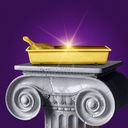Cat lovers are spending hundreds on AI litter boxes

There's a big-dollar arms race in high-tech cat waste "solutions," from color-changing litter that can detect diseases to AI tech that tracks Fluffy's toileting habits.
Why it matters: As COVID-era cat ownership has surged, companies large and small have flooded the market with products aimed at improving pet health and reducing the top reason people return cats to shelters: Litter box unpleasantness.
- Products like the $700 Litter-Robot — which makes scooping obsolete and will soon come with a health-monitoring app — fall into an exploding "pet tech" category.
- Surging sales of pet-care products have translated into squadrons of researchers studying the tastes of cats and consumers — developing litter that dissolves in water, is made from tofu, has good "paw feel," etc.
- "It is an incredibly exciting time to be in the cat litter business," says Brent Gleckler, vice president and general manager of the golden products division at Nestlé Purina PetCare. Innovation is "helping us understand more about our cats than we really ever have been able to."
Driving the news: That familiar plastic tub filled with clay litter is morphing into an AI-powered hardware/software platform that includes a scale to weigh what Tabby has been doing (and detect if she's putting on pounds), an app that alerts when she's done her business (and tracks the frequency) and health-monitoring litter that can flag urinary tract infections or other problems.
- The Litter-Robot 4 — which will ship in August — is a Wi-Fi-enabled, automated, self-cleaning box connected to an app, so you can monitor your cat's weight and bathroom habits.
- The product — the most advanced on the market — is "a software platform enabled by hardware" that will "continually evolve for the next decade," says Jacob Zuppke, president and CEO of Whisker, which makes the Litter-Robot.
"I was one of the beta users of the Litter-Robot app, and we got 18 notifications in like one hour," Zuppke said. "I didn't know if it was a beta flaw or something was happening with our cat." (A swift — and possibly life-saving — trip to the vet revealed a UTI.)
Also in the offing: The forthcoming Petivity Smart Litterbox Monitor System from Nestlé Purina is a $200 scale that sits under your cat's litter pan and transmits data about a "solid waste or liquid waste event," as Gleckler put it.
- It'll keep track of the amount of time your cat spends in the litter box, behavior changes and other metrics that could help detect common problems like diabetes, kidney disease and obesity.
- Gleckler, who heads the division that makes the product, is a satisfied customer. "I got a notification from the app that Felix had started losing weight, and it prompted me to take him to the vet," he said.
Between the lines: The world of litter and boxes is remarkably suffused with controversy, marked by routine throwdowns over clay litter (a potential carcinogen?), enclosed litter boxes (do you enjoy a port-a-potty?) and environmental concerns (clay litter, again).
- Responding to the multifarious qualms of pet parents, you can now buy litter made from pine, wheat, silica gel, soybeans, grass, corn, paper pellets or walnut shells.
- For eco-conscious cat lovers, there are recyclable, biodegradable and disposable litter boxes that are even available by monthly subscription.
Yes, but: The high-tech litter solutions are far more expensive than a simple cat box — the Litter-Robot 4, for instance, costs $650, while a rival offering, the Purrsong Lavviebot S Robotic Litter Box, goes for $900.
- Zuppke argues that with the Litter-Robot, you're investing in a high-end household appliance — he likens the brand to Dyson or Samsung.
- The expensive knockoffs tend to be made in China, he said, while "we are affordably making them in the United States in a manufacturing facility that is clean and awesome."
What they're saying: "For me, it comes down to how easy it is to clean the box," says Kate Benjamin, founder of Hauspanther, a resource center for stylish cat products.
- Benjamin, who has 13 cats in her Phoenix condo, uses cement mixing tubs from Home Depot as litter boxes on her outdoor "catio," plus boxes made by PetFusion and Tuft + Paw indoors.
- Her favorite "pet tech" product is a feeder — the Sure Petcare Felaqua Connect — that tracks each cat through its microchip, monitoring its weight and how much water it drinks. It's also connected to an app.
- "Anything that regularly weighs your cat is absolutely worth its weight in gold," says Benjamin.
The bottom line: Not only have people been adopting more pets since the COVID-19 pandemic began, but they've also been paying a lot more attention to their animals' needs and habits.